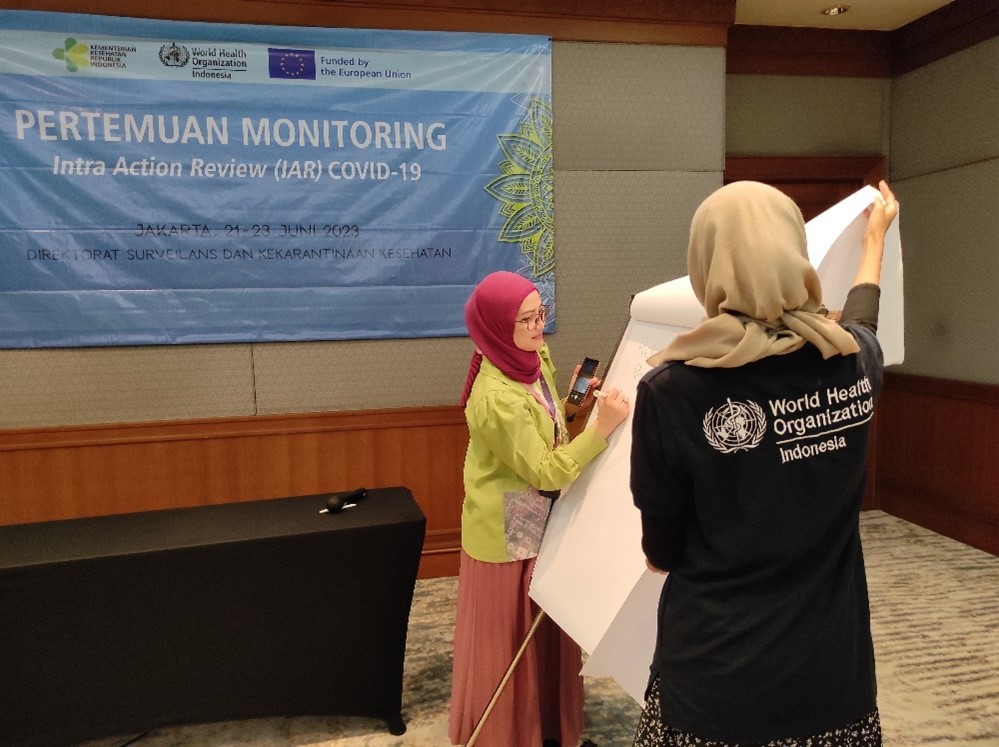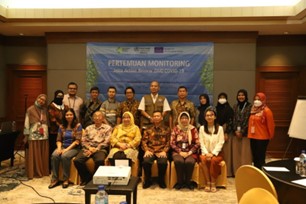On 25 May 2023, the WHO Director-General determined that COVID-19 is now an established and ongoing health issue which no longer constitutes a public health emergency of international concern (PHEIC). Subsequently, the President of Indonesia announced the revocation of the emergency status of COVID-19 in Indonesia. However, the evolving and dynamic nature of SARS-CoV-2 and other emerging disease threats continue to pose public health risks.
Despite a decreasing trend in COVID-19 cases, a decline in hospital admissions, along with an increase in population immunity, maintaining preparedness for health emergencies remains essential. Lessons learned from the COVID-19 pandemic highlight the importance of a transition strategy for establishing long-term management of COVID-19, as well as sustaining the efforts to strengthen the health system’s resilience initiated during COVID-19.
WHO supported the 8th Intra-Action Review hybrid meeting held from 21-23 June 2023 in Jakarta, attended by 170 participants from various sectors. The participants included representatives from the Ministry of Health (MoH), the National Disaster Management Agency, the Coordinating Ministry of Human Development and Cultural Affairs, the Cabinet Secretariat, the Ministry of Agriculture, universities, professional associations, non-governmental organizations, and the National Research and Innovation Agency.
During the meeting, WHO presented the updated Global Strategic Preparedness, Readiness, and Response Plan (SPRP) for 2023-2025, which is in line with the WHO guidelines on Preparedness and Resilience for Emerging Threats (PRET). The plan covers five components: (1) Emergency coordination; (2) Collaborative surveillance; (3) Community protection; (4) Safe and scalable medical care; and (5) Access to countermeasures.

Development of recommended priority actions during the 8th IAR meeting. Credits: WHO/Endang Widuri Wulandari
The IAR highlighted that the COVID-19 task force has been instrumental in leading emergency coordination from the national to the community level. This coordination played a crucial role in enhancing preparedness, not only during pandemics but also during transition stages and interpandemic periods (periods between pandemics). Aligning pandemic response with the national disaster framework has enabled access to the necessary resources and emergency funding required for a scalable COVID-19 response. Addressing surge capacity for human resources during emergencies, the for Health Crisis MoH launched an initiative to establish a health reserve workforce that is prepared prior to an emergency to be mobilized during crisis situations.
Furthermore, during the pandemic, continuous updates through dashboard monitoring of COVID-19 cases, severity (inpatients and deaths), response capacity through testing, tracing, and treatment (bed occupancy rate), and vaccination coverage have guided the risk assessment for public health and social measures. The risk communication strategy and engagement plan for COVID-19 was employed to engage the community in COVID-19 response, develop tailored emerging infectious disease (EID) materials, and engage with the media, addressing misinformation, countering hoaxes, and conducting daily media monitoring.
The IAR also presented findings from existing COVID-19 research through rapid reviews, supported by WHO. Conducted by several universities and research institutions, presenters confirmed the effectiveness of the Incident Management System for emergency coordination in COVID-19. The research also indicated the pandemic's impact on vital health services, underlining the need for adaptable strategies, including digital health and community-based surveillance for early detection and containment.
The IAR resulted in the following key recommendations:
- Continuous multisectoral coordination for emerging threat preparedness through the implementation of Coordinating Ministry for Human Development and Cultural Affairs Regulation No. 7 of 2022, which provides guidelines for the prevention and control of zoonoses and emerging infectious diseases involving multi sector.
- Updating pandemic preparedness plans and conducting simulation exercises in line with WHO's preparedness and resilience for emerging threats guidelines at national and sub-national levels, incorporating lessons learned from COVID-19.
- Improving surveillance using data from multiple sources for further analysis and prompt response. These sources include the Early Warning Alert and Response System (EWARS) involving primary healthcare and hospitals, influenza-like illness (ILI) and severe acute respiratory infection (SARI) sentinel surveillance, community-based surveillance, environmental surveillance, laboratory-based surveillance, genomic surveillance, and integrated human-animal interface surveillance in a One Health approach.
- Advancing information sharing among multiple sectors and conducting joint risk assessments to mitigate risks.
- Continuing to monitor and update hospital pandemic preparedness plans and testing, along with capacity building for hospital EID preparedness, including case management and infection control.
- Updating the pandemic vaccine deployment plan to address vaccine distribution and flexibility of reallocation based on needs assessments, and improving real-time vaccine reporting applications. Continuous monitoring of medication production and distribution and monitoring of side effects are still needed.
- Improving multisectoral collaboration and communication at points of entry, including cross-border detection and response for public health emergencies, as well as the development of contingency plans and testing.
- Continuing to conduct and institutionalize misinformation management and capacity building for risk communication and community empowerment through tailored programmes considering the local context.
“Even though COVID-19 has been declining, we need to embrace the lessons learned from COVID-19 to enhance preparedness and resilience for emerging threats involving multiple sectors. Therefore, it is essential to integrate COVID-19 pandemic coordination, surveillance, and response into the existing system," said Dr. Endang Burni, Head of the Emerging Infectious Diseases Working Group at the Ministry of Health RI.
Meanwhile, Mr. Teguh from the Cabinet Secretariat of the Republic of Indonesia, stated, "Multisectoral collaboration at all levels is essential to combat the COVID-19 pandemic. This engagement should be maintained to prepare for future public health emergencies through periodic updates of plans and exercises."
The IAR has served as an effective multisectoral coordination platform to review and monitor the COVID-19 response, identify lessons learned, and address gaps, involving active contribution and participation of key stakeholders and partners at all levels.
This approach has been instrumental in improving the COVID-19 response and will pave the way for a comprehensive strategy for preparedness and resilience against emerging threats. This meeting marked the final IAR in this series. The subsequent and concluding step will be the After-Action Review (AAR), reflecting on lessons learned for comprehensive evaluation of the COVID-19 response. WHO will continue to advocate that this practice should be continued to review responses to future public health events as a core tool of the International Health Regulations monitoring and evaluation framework.
Furthermore, based on lessons learned from COVID-19, Indonesia has initiated national health transformation agenda and is leading initiatives on One Health and pandemic preparedness in international forums. Examples include the G20 meeting on building global health system resilience and the ASEAN Leader Declaration on One Health initiatives.
The IAR report in Indonesian language is available here.

COVID-19 Intra-Action Review (IAR) meeting, 21-23 June 2023 in Jakarta. Credits: WHO/Endang Widuri Wulandari
***
Funded by the European Union.
Written by Dr Endang Widuri Wulandari, National Professional Officer (Epidemiologist), WHO Indonesia.
